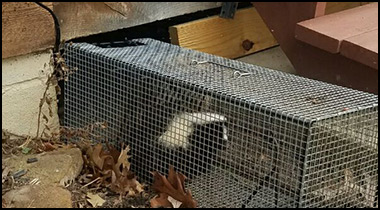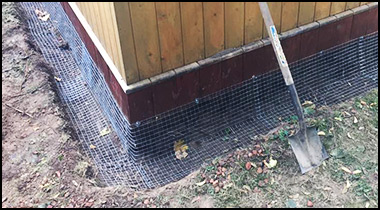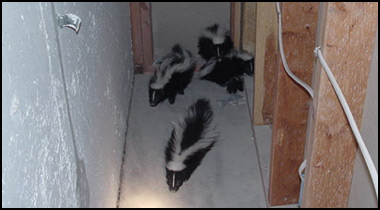Canton Skunk Removal Resources
Skunk Rehabber - Wildlife Center: (330) 477-0448
Free Stark County Animal Services: (330) 453-5529
Humane Wildlife Trappers of Canton: 440-527-6300
If you need skunk control in Canton, you have a few options. First, you can attempt to solve the skunk problem yourself by reading our do-it-yourself guide. If you need outside help, you can also call Stark County Animal Services to see if they have any free resources or help for you - however, they primarily deal with dog and cat concerns. You can also call a local Canton wildlife rehabber, as they are typically a great resource for advice that is in the best welfare of the animal. If as a last resort you must hire a professional company, we recommend Humane Wildlife Trappers of Canton at 440-527-6300. To learn more about them or check their skunk removal prices, visit cantonpestanimal.com.

Canton Skunk Trapping and Removal

Preventative Repairs & Exclusion

Canton Skunk Removal From Structures
In many cases, preventative measures can solve your Canton skunk problem - keep garbage secured, pet food indoors, and most of all when it comes to skunks, secure the perimeter of your shed, porch, deck, or house with a barrier - lattice or steel mesh is good, and it keeps Ohio skunks from going under the structure. If trapping and removal of the skunk is the only option you have, please do so with the help of a local agency or professional company who knows how to do it humanely and legally. Browse the resources of this site for more educational information.
Frequently Asked Questions:
Prevention: How to Keep Skunks Away
What to do with a skunk after I catch it?
Is it legal for me to trap a skunk?
How to remove skunk odor
Is a skunk active during the daytime rabid?
What does skunk feces look like?
Canton Skunk Control Information: Unwanted house guest
We've all had them at some point. Unwanted house guests. They are annoying, they invade your space and eat all your food. They don't clean up after themselves and when they are finally gone, they leave behind an odd odor.
Okay, so maybe we're not talking about human house guests. We are talking about those little black and white fluffy little stinkers. That's right, we're talking about skunks.
Typically, when skunks are looking for shelter, they will dig themselves dens. They have long claws and are excellent at digging. If they don't dig themselves new dens, then they will generally seek somewhere that is warm, dry and will keep them safe for the elements. Sometimes this will include sheds, under porches, and other out buildings.
Skunks, like most wildlife, are attracted to food. If there is food left outside such as dog or cat food, you can bet a skunk won't be far off. While it isn't too common for skunks to find their ways inside homes, it does happen on occasion.
Remember, if you happen on a skunk in your house, don't panic. These creatures are not dangerous and will typically go out of their way to avoid you. This is a good thing because face it, getting sprayed by a skunk in your house is nobody's idea of a good time.
So what do you do if you find a skunk in your house? Well, be careful. You don't want to just try to catch it not only for the obvious reasons, but skunks are known carriers of rabies. Better safe than sorry.
First, make it as bright as possible in the room. Skunks are ultra-sensitive to light. By increasing the light, you are virtually blinding them. This will work in extreme situations, but be careful. If they leave the one room, they might just go into another one.
If it's a room that has access to an outside door, the simple thing to do would be to open the door and allow it to go out on its own. If it's during the day, the skunk isn't too likely to move around a lot since they are nocturnal. After opening the door, you could leave some food on the outside. Egg shells, veggies or berries are good idea. Eventually, they will leave in search of the food.
Remember, they got into your house because they were seeking shelter. Be careful
Remember, for free services you can try (330) 477-0448 or (330) 453-5529, but if you need to pay for professional help, check the prices at the cantonpestanimal.com website. Or follow our do-it-yourself guide!

